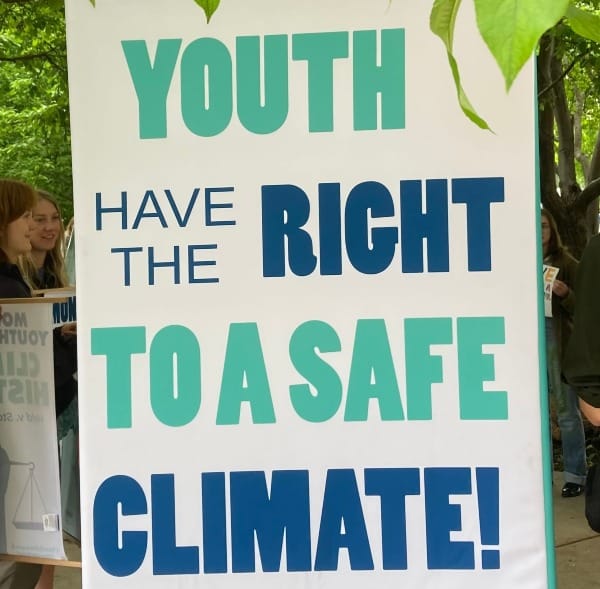Montana Defendants Claim Trial Judge "Had No Authority" To Rule On Historic Youth Climate Case

In August 2023, Montana District Court Judge Kathy Seeley issued what has been described as a “landmark” and “historic” win for the sixteen young people who sued their state government over a policy that bans regulators from even considering climate change in routine environmental impact assessments. Following a seven-day trial in June, Seeley determined that Montana had violated its state constitutional guarantee of the right to a clean and healthful environment through this policy that shielded fossil fuel projects from scrutiny over their climate impacts – the first time in U.S. history that a government has been held accountable under constitutional provisions for actions that contribute to the climate crisis.
Now, Montana is urging the state’s highest court to overturn that ruling by arguing that Seeley should never have been allowed to decide on the case in the first place.
In their opening brief filed with the Montana Supreme Court on February 12, state defendants in Held et al. v. State of Montana claimed that the district court “had no authority to decide this case” because the youth plaintiffs lacked what is called standing, or the permission to be in court bringing a lawsuit. Specifically, the state argues that the policy at issue in the case did not cause climate change injuries to plaintiffs. It also argues that invalidating the policy would not redress any alleged harm, because scrapping it would not substantially alleviate the global climate crisis. In making these arguments, state defendants say that the ‘causation’ and ‘redressability’ requirements for plaintiffs to have standing have not been met.
However, the state is not refuting the facts and evidence underlying Seeley’s decision or directly challenging her determination that the policy was unconstitutional. Instead, the state is claiming that it was not her place to even make that judgment.
“It was very interesting that the State did not argue that Judge Seeley was wrong in finding that the state law barring consideration of climate change in making energy policy violated the environmental rights provisions of the state constitution. This amounts to an admission,” Michael Gerrard, founder and faculty director of the Sabin Center for Climate Change Law at Columbia Law School, said via email.
While the Held lawsuit had a broader scope when it was filed in 2020, by the time it reached trial last year it had been narrowed in terms of challenged policies and requested relief. Seeley had denied plaintiffs’ request for ordering the government to develop a climate recovery plan to rapidly decarbonize in line with the best available science. The court could only declare government acts to be unconstitutional, not order a certain policy course change. By the time of trial, the sole policy or state law that she would be scrutinizing was a statute that prohibited assessment of climate impacts or greenhouse gas emissions under the Montana Environmental Policy Act (MEPA). It was essentially a weakening or restriction of MEPA, mandating that state agencies like the Montana Department of Environmental Quality turn a blind eye to climate pollution when doing environmental reviews as part of the permitting process. Seeley referred to it as the “MEPA limitation.”
Echoing the arguments made at trial, state defendants asserted in their appellate brief that MEPA is strictly procedural and has no bearing on permitting decisions. The MEPA limitation therefore has no substantive authority or influence on regulators’ issuance of permits for environmentally harmful activities like a coal mine expansion, according to defendants.
Seeley did not find such arguments convincing, and the state does not appear to be claiming that she was wrong in her finding that the MEPA limitation policy is unconstitutional. What the state is saying is that courts cannot tell the political branches what to do. Even if the MEPA policy is unconstitutional, agencies “are not are not required to analyze GHG emissions and climate impacts in MEPA reviews”, defendants argue. In other words, the state contends that while Seeley’s decision may invalidate the MEPA limitation, it is not a mandate that regulators must analyze GHG emissions in every environmental review. They could, and they are not prohibited from doing so, but they are not required to do this analysis – or so their argument goes.


